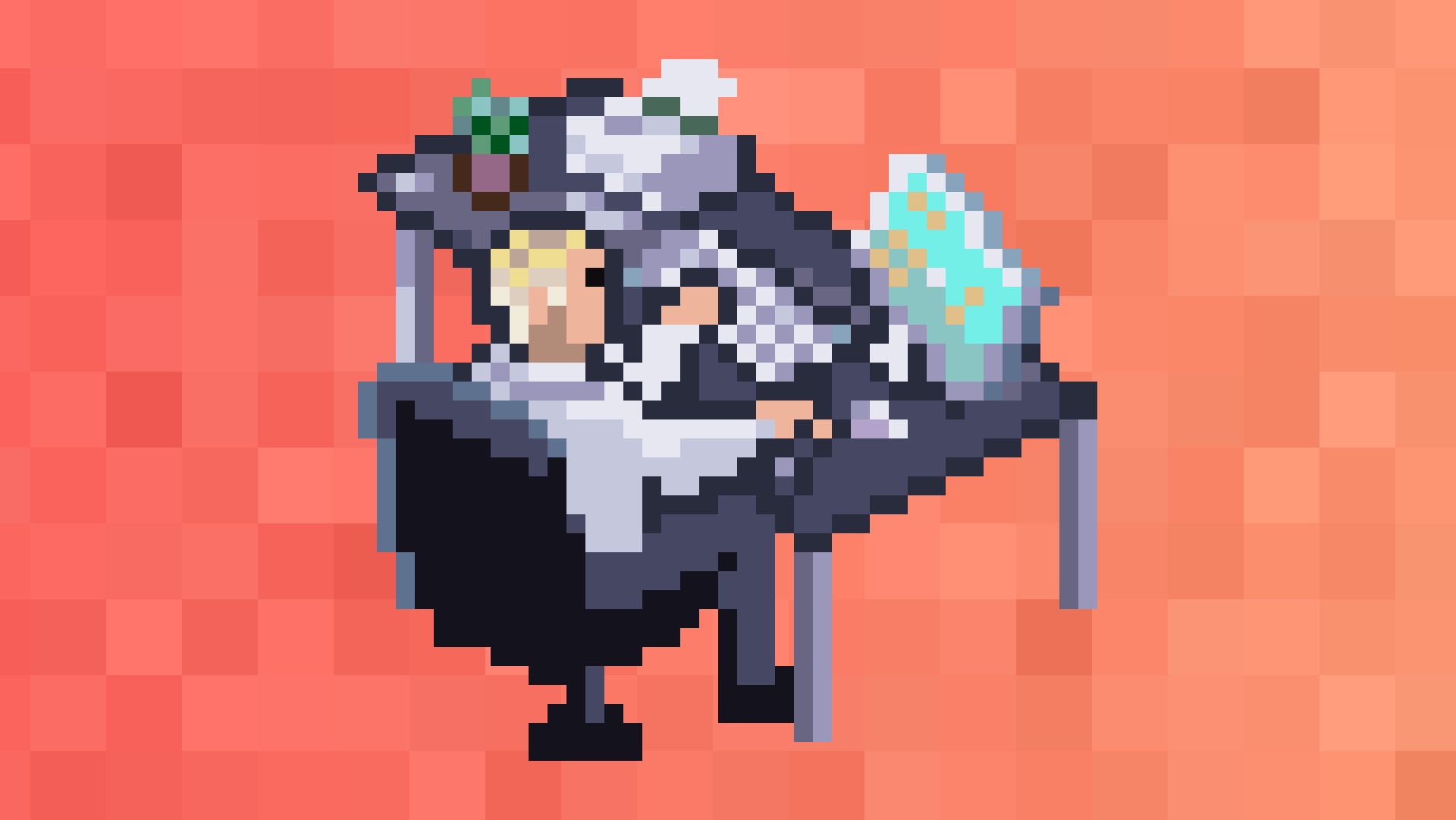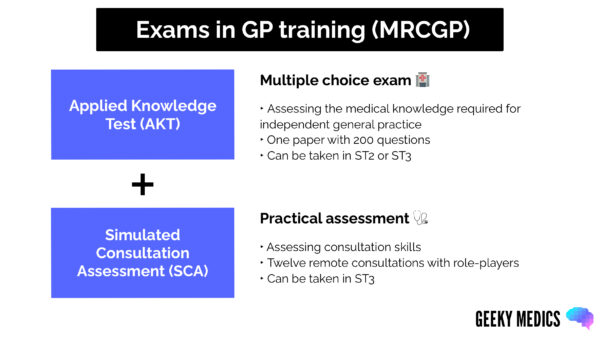- 📖 Geeky Medics OSCE Book
- ⚡ Geeky Medics Bundles
- ✨ 1300+ OSCE Stations
- ✅ OSCE Checklist PDF Booklet
- 🧠 UKMLA AKT Question Bank
- 💊 PSA Question Bank
- 💉 Clinical Skills App
- 🗂️ Flashcard Collections | OSCE, Medicine, Surgery, Anatomy
- 💬 SCA Cases for MRCGP
To be the first to know about our latest videos subscribe to our YouTube channel 🙌
What is the Simulated Consultation Assessment (SCA)?
The simulated consultation assessment (SCA) is one of the two key exams GP trainees must pass during their GP training programme. Passing the SCA is required to achieve a certificate of completion of training (CCT) and become a GP. The other exam is the applied knowledge test (AKT).
The SCA involves GP trainees completing twelve simulated consultations with simulated patients. The exam is designed to test your consultation skills.
The SCA is a remote examination undertaken online. Most consultations are video consultations; however, some are audio only.
How do I sit the SCA?
The SCA is a remote online examination that is taken during the final year of GP training (ST3). You will need to book a place and pay the exam fee (currently £1,180). This fee cannot be claimed back from your study budget, and if you need to resit the SCA, you will need to pay the fee again!
The SCA has nine sittings throughout the year, and the dates are available on the RCGP website.
To sit the exam, you will log into an online platform (Osler Online) using a computer in a local GP surgery. This will usually be the GP surgery you are working at.
You will need to book a room in the GP surgery to complete the SCA. This process will vary between GP training programmes, so check with your trainer.
The SCA is an invigilated examination, and you cannot bring in notes or electronic devices to help you during the examination. The room must be set correctly, and more information is available on the RCGP website.
What does the SCA involve?
During the SCA, you will be assessed by performing 12 remote consultations with a role player. Most of these consultations will be via video (you will be able to see the actor). However, some will be audio-only (similar to performing a telephone consultation).
Most consultations will involve the role player taking on the role of the patient. However, some cases involve consultations with carers, relatives or other healthcare team members.
Each simulated consultation will last 12 minutes. Before each consultation, you will be shown candidate instructions, giving you some background information on the case. This information may include:
- Notes from recent consultations
- Recent test results
- Past medical history
- Medications
- Letters from other healthcare professionals
Example of candidate instructions
Patient details
- Name: Reese Baxter
- Age: 3 years 3 months
- Past medical history: none
- Current medications: none
- Allergies: none known
Last consultation (3 months ago)
- Face-to-face appointment with Mum
- Unwell for a week. Very coryzal, not eating much
- High temperature for a few days, coming down with paracetamol
- Mum wants to get him checked out before the weekend
- Drinking well, having plenty of wet nappies
- Examination challenging – Reese spent a lot of it screaming and distressed
- Well perfused, chest generally clear. Throat a little red
- Imp: Well child, likely viral URTI
- Plan: Mum reassured, will keep an eye, paracetamol as needed and push fluids, safety netted – any worsening or if not improving to seek further help
After you have read the candidate instructions, you will undertake the remote consultation with the role player.
Once you have completed the 12 consultations, the exam will end.
What cases could appear in the SCA?
The SCA cases are designed to represent common, everyday clinical presentations in general practice. These are the ‘bread-and-butter’ scenarios that a GP would routinely handle. Examples could include managing chronic conditions like diabetes or hypertension, dealing with acute illnesses like respiratory infections, and providing preventative health advice.
The RCGP has created a list of clinical experience groups to which cases will be mapped (a ‘blueprint’).
SCA blueprint
- Patient less than 19 years old
- Gender, reproductive and sexual health, including women’s, men’s, LGBTQ+, gynaecology and breast
- Long-term condition, including cancer, multi-morbidity, and disability
- Older adults, including frailty and people at the end of life
- Mental health, including addiction, smoking, alcohol, substance misuse
- Urgent and unscheduled care
- Health disadvantage and vulnerabilities, including veterans, mental capacity, safeguarding, and communication difficulties
- Ethnicity, culture, diversity, inclusivity
- New presentation of undifferentiated disease
- Prescribing
- Investigation/results
- Professional conversation/professional dilemma
Source: RCGP
The cases used will vary between each sitting of the SCA.
How is the SCA marked?
The marking of the SCA is complex and involves more than a simple checklist of steps trainees are expected to complete during the consultation.
Marking domains
Firstly, there are three marking domains used for each case:
- Data gathering and diagnosis
- Clinical management and medical complexity
- Relating to others
For every case, examiners will judge the candidate’s performance in each domain. They will award one of the following grades for each domain:
- Clear pass: above the standard of a newly qualified, independent GP
- Pass: at the standard of a newly qualified, independent GP
- Fail: insufficiently demonstrated at the standard of a newly qualified, independent GP
- Clear fail: clearly demonstrated below the standard of a newly qualified, independent GP
Overall judgement
As well as grading the three domains, examiners will provide an overall judgement for each case. They will award one of the following judgements, taking into account the candidate’s performance in the case:
- Pass: meets the standard for an independent newly qualified GP (any omissions or errors are minor/trivial)
- Bare pass: a just passing candidate (omissions or errors made, but the candidate has done enough to demonstrate fitness to consult as an independent newly qualified GP)
- Bare fail: a just failing candidate (presented some evidence, but insufficient for fitness to consult as an independent, newly qualified GP; omissions or errors likely impact patient care/outcomes)
- Fail: does not meet the standard for an independent newly qualified GP (minimal evidence presented and/or patient put at risk of harm)
The SCA pass mark
There is no set number of stations you have to pass. The pass mark for each sitting is decided using a standard setting process called borderline regression.
Borderline regression
During the SCA, each trainee is scored at each station. Additionally, examiners make a separate, overall judgement for each student at each station – whether they think the trainees’s performance is clearly above the pass level, borderline, or clearly below.
The borderline regression method uses statistical techniques to analyse this data. It looks at the scores of students judged to be on the borderline. Then, it calculates the average score for these borderline students across all stations. This average score becomes the pass mark.
This explains why there is no single set pass mark for the SCA. The pass mark will vary between sittings of the SCA.
What happens if I fail the SCA?
If you fail the SCA, you must resit the exam and pay the registration fee again.
For trainees who entered training before 1st August 2023, a maximum of five attempts are allowed for the SCA. In exceptional circumstances, a sixth attempt may be allowed.
Six attempts at the SCA are allowed for trainees who entered training after this date.
Average pass rate
The SCA is a new examination which replaced the recorded consultation assessment (RCA) introduced during the COVID-19 pandemic. Therefore, there is limited data available on pass rates. The approximate pass rate so far is around 66%.
References
- Royal College of General Practitioners. SCA guide. Published in 2023. Available from: [LINK]
- Royal College of General Practitioners. MRCGP exams. Published in 2022. Available from: [LINK]





